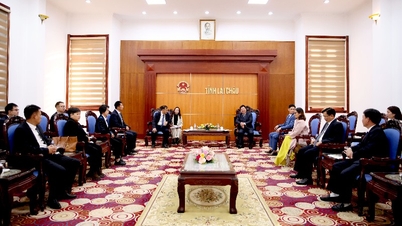Decision No. 2014/QD-TTg of the Prime Minister dated September 12, 2025 (Decision 2014) has identified a group of tasks and long-term support solutions for the goal of upgrading the Vietnamese stock market, including implementing the Project on applying international accounting standards, encouraging large-scale listed enterprises to publish financial statements (BCTC) according to international standards (IFRS).
The implementation of this Project, which allows enterprises to apply the IFRS prototype, is considered a transition to a “dual” model of Vietnamese accounting. Opening up new development space, with international options for enterprises, this step will support the goal of increasing transparency in the stock market, creating new momentum for growth and international economic integration on a sustainable roadmap.
Mr. Pham Nam Phong, Deputy General Director of Audit & Assurance Services, Deloitte Vietnam, has had some more detailed analysis and sharing on this issue.
What is your general comment on the task of implementing the IFRS application project, encouraging large-scale listed enterprises to publish financial statements according to IFRS standards under Decision 2014 in the coming time?
I consider the implementation of this Project in the coming time to be a big step forward in terms of institutions, allowing the accounting and financial information system of Vietnamese enterprises to reach the same level as the world when they are built on the same "platform" which is IFRS. When meeting certain criteria of the management agency, enterprises will be allowed to decide to apply IFRS to prepare financial statements for statutory purposes in Vietnam based on the needs and resources of the enterprise in accordance with market principles.
If VFRS - VAS standards are comprehensively upgraded in the direction of approaching IFRS, a comprehensive, fundamental and long-term development process is needed, then allowing the immediate application of IFRS will be a different "shortcut, anticipating" step.
This is a positive point that creates a ready position for Vietnamese enterprises to deeply integrate into the international playing field, increase investor confidence, enhance the image and position of the country and enterprises, and at the same time expand and attract international investment capital at lower costs as well as help improve corporate governance capacity and market transparency based on information with international quality standards.
 |
| Mr. Pham Nam Phong, Deputy General Director of Audit & Assurance Services, Deloitte Vietnam |
A core content in implementing the IFRS prototype in Vietnam is to determine the subjects that are allowed to apply. So, in your opinion, which groups of enterprises can be included?
This is an important content for most countries in the world that wish to implement the IFRS prototype. Instead of widespread application, the policy orientation is intended to protect the integrity of the market, create a “model” of high quality IFRS reporting, guide the business community, help the implementation process take place sustainably, effectively and receive wide consensus.
Based on international experience and statistics of the International Accounting Standards Board (IASB), the group of entities allowed to apply IFRS according to the roadmap in Decision 345 dated March 16, 2020 of the Minister of Finance approving the Project on applying financial reporting standards in Vietnam (Project 345) will be considered and can be adjusted to suit the new context.
These entities can be the following groups and need to meet certain high scale criteria (revenue, market capitalization, leading position in the industry…).
The first group has high requirements for transparency and accountability due to its public interest nature, including listed organizations, large public companies, credit institutions (receiving deposits from the public), and insurance organizations (providing insurance to the public). This group is popular and is considered the most important international measure when assessing the level of IFRS implementation in a given country.
The second group is considered to have been or will need to be at a high level of readiness to apply IFRS, because in practice, it has been or will need to use IFRS reporting for certain purposes, for example, raising capital with international organizations or regularly providing financial information to foreign parent companies, including typical enterprises leading economic sectors in Vietnam, enterprises with 100% foreign direct investment, large-scale enterprises with state investment capital (state-owned enterprises) with international loans.
Although this group is more developed internationally, this may also be a consideration to suit the context of Vietnam in creating more space for selected enterprises to increase domestic and international investment attraction to meet growth targets.
In addition, another entity, a member of the International Financial Center in Vietnam, has been allowed to apply IFRS under Resolution 222 of the National Assembly, effective from September 1, 2025.
The number of listed and public enterprises in Vietnam is currently relatively large, so quantitative criteria are needed. to ensure implementation and monitoring capacity. Personally, I expect that the result will be about 150-300 enterprises being allowed to apply IFRS, of which about 50-70% will actually implement within 3 years after the time of allowing application when implementing the Project.
What matters is not the quantity but the quality of implementation when considering the spillover effects reflected in the market capitalization and industry leadership position of IFRS-adopting enterprises.
Could you share more about the challenges in implementing this IFRS application project to increase transparency in the market as well as catch up with the international community?
Issued from 2001 to 2005 and followed by legal documents related to accounting for enterprises (hereinafter referred to as VAS), the Vietnamese Accounting Standards System has been closely integrated into the way managers operate, the way professional agencies manage, as well as the way financial statement users read, understand and make decisions. Accordingly, the conversion to apply only the IFRS prototype will pose many big challenges.
These challenges are grouped by subject and the corresponding regulations that need to be complied with regarding accounting and financial information.
The level of challenges when applying IFRS by business group
The first and perhaps biggest challenge is the technical nature of the banking and insurance sector. IFRS regulations in this sector are considered to be the most complex and have high requirements for information systems, data, risk management, calculation models and forecasting, and currently, there is a large gap with VAS. IFRS conversion can have a major impact on information for credit growth management, banking system safety and monetary policy management, both at the enterprise and economic levels. Given the current volatile context and implementation experience in some countries with the insurance industry, the need for a more cautious conversion roadmap with supervision from the management agency in this sector is considered appropriate.
Second challenge and the default challenge of most countries is the gap between IFRS and the regulations of the tax authorities. In Vietnam, the differences already exist when enterprises apply VAS for accounting purposes and tax calculation according to the regulations of the tax authorities. The application of IFRS will further widen the previous differences and create new gaps that need to be explained and explained more to the tax authorities later.
The third and main challenge, which requires the most determination to be resolved, includes: Ensuring compliance with legal obligations and the stability of the current accounting legal system, compared to the principles of IFRS standards, thereby creating conflicts when applying; and The "parallel" existence of two types of financial statements, either according to VAS or according to the IFRS prototype, both having legal value, instead of only one type of financial statements according to VAS in the whole market. This poses difficulties in collecting, processing and evaluating information of the subjects using financial statements, reducing the comparability of information between enterprises as well as compatibility when integrating the new information system according to IFRS into the current national accounting and financial information system of enterprises, affecting the consistency and smoothness in economic operations and management.
Do you have any basic solutions to these challenges?
Observing the implementation of IFRS in other countries, I assess that the above main challenges of Vietnam are relatively similar to some countries, only different in level and context when considering the large gap between the international and Vietnam at present. Among the solutions being evaluated, there may be two basic groups of solutions.
The first solution is to require that IFRS implementation is only allowed for consolidated financial statements, not for separate financial statements, and when choosing to apply IFRS for consolidated financial statements, that is the only consolidated financial statement with statutory legal value.
Allowing the application of IFRS only to consolidated financial statements still ensures the core objectives and benefits of applying IFRS because this is of course the most comprehensive and complete report of the group when the enterprise has subsidiaries, while it will help avoid major challenges due to legal compliance requirements on accounting and tax obligations in creating financial statements. At that time, the enterprise only has to comply with IFRS accounting standards at the group level, which does not have legal status. At each company in the group, the companies still ensure compliance with legal regulations on financial statements when creating separate financial statements of the company's legal entity, including VAS, accounting regulations for state-owned enterprises (if applicable) and possibly regulations of tax authorities.
Technically, the conversion to allow the application of IFRS is understood as Vietnam's conversion to a "dual" accounting model (dual system) with two types of financial statements. At that time, enterprises need to maintain a system to prepare two types of reports, in which consolidated financial statements are prepared according to either IFRS or VAS, while separate financial statements must follow VAS (there is no other choice). Both of these reports have independent legal value and do not replace each other because the scope, objectives and legal basis for creation are different. In addition, the meaning of "dual" can be understood that in the same group of enterprises, there will still exist two types of consolidated financial statements because enterprises have the right to decide to apply them based on their own needs and resources.
The strong and decisive choice of separation will create a clear red line, thereby helping businesses to carefully assess when making decisions to apply IFRS at the consolidated level. In addition, the subjects using financial statements can be sure that they are using the right reports for their own purposes, ensuring both free market principles and a controlled and effective transition roadmap. International experience also shows that some countries in the European Union such as Germany, France, Spain, Portugal, Austria, Poland, Romania or Switzerland and Japan also apply a similar "dual" model.
The second solution to successful IFRS implementation is to require IFRS transition disclosure and identity transparency.
Specifically, the first is the requirement to provide additional information to reconcile the differences between IFRS and VAS or to explain the main differences of some material items in the two years after the first year of conversion. This helps maintain comparability when the users of financial statements can still collect and use most of the information according to the previous VAS in the additional explanatory section and create a “buffer” to improve capacity (training, systems, policies, processes) and upgrade monitoring and compliance mechanisms.
Although this solution may put a lot of pressure on businesses in the early stages, it is the choice of the businesses themselves when considering the benefits and costs that IFRS brings under the "permissive" mechanism, instead of the "mandatory" mechanism of the management agency. In the long term and the economy as a whole, applying the principle of decreasing marginal costs as the scale of application increases, the cost of implementation will gradually decrease due to the growth and maturity of the ecosystem necessary for IFRS implementation.
The ecosystem includes the quality of human resources, in-depth IFRS knowledge documents, the availability and reliability of fair value information, estimation models, expert teams, implementation experience of pioneering enterprises and, most notably, the increasingly superior support of generative artificial intelligence (GenAI). In addition, the cost of implementing IFRS will also be further optimized when it goes hand in hand with the process of implementing, upgrading ERP as well as digital transformation of the enterprise.
In case the “permission” mechanism does not work effectively when the new policy is issued, specifically the number of enterprises applying high-quality IFRS is lower than the target, it is possible to consider adding a “mandatory” option to apply to a number of enterprises with sufficient capacity and resources to create institutional breakthroughs and pioneering and leading implementation.
In case the mechanism is effective, the management agency can evaluate to switch to a “mandatory” mechanism for all enterprises in the same group of subjects to minimize or eliminate the problems of comparability between enterprises. In addition, it is also advisable to consider announcing a roadmap to the “mandatory” mechanism to the market, although this is relatively difficult, to create a clear orientation to help the entities that create and use financial statements to build their own roadmap effectively.
Next is the requirement to disclose transparent information to clearly identify on the information disclosure system about enterprises applying IFRS and financial statements prepared according to IFRS as well as the requirement to explain information on financial statements with a declaration of compliance with IFRS. It is possible to mention the note "prepared in accordance with IFRS" right on the title of financial statements so that users can easily identify, collect and evaluate information.
Choosing a dual accounting model and especially allowing IFRS to be applied only to limited groups of entities that meet specific criteria and not to the whole, for example, all listed companies as is common experience in other countries, is a difficult but necessary choice.
It is a problem of balancing the “benefits” of achieving comparability and uniformity of information in the market and the “costs” of implementing too much for too many businesses, including implementation resources and compliance monitoring mechanisms. Most importantly, ensuring the quality of financial statements avoids being just formal and formatted while not inherently complying with IFRS. It is also a problem when comparing the two options, there will be no attempt to implement the IFRS prototype for many subjects when there is no effective compliance monitoring mechanism and the option to further accelerate the development of VAS to VFRS, approaching IFRS.
The option of only allowing IFRS to be applied to limited groups of subjects, meeting specific criteria, will require accepting a challenge of comparability. However, I personally think that it can be a suitable and optimal choice when accompanied by a solution of disclosure of transition information, clearly identifying IFRS, especially in the context of the current large difference between IFRS and VAS. More importantly, it must consider the need for rapid innovation, allowing Vietnamese enterprises to catch up with the world in accounting and the goal of upgrading the stock market.
The solutions proposed above have been practically applied in developed countries and countries in the region.
You mentioned the concern of business managers that the application of IFRS can create unexpected, sometimes material, changes in the business results and financial situation of the enterprise. Can you share more about the solution to solve this problem?
This may be the biggest “invisible” barrier when applying IFRS, not only in Vietnam but also quite common in countries around the world. This concern is well-founded when users of financial statements will question the management capacity and responsibility of managers for any changes in the financial information of the enterprise.
Applying a new reference system, IFRS, will inevitably change the information, data, and explanations on the financial statements because the objective business operations of the enterprise will be understood, interpreted, and communicated in a new way.
In addition, during the comprehensive “health check” process that is often conducted when first converting, the hidden corners of the long-standing enterprise will be revealed more clearly when placed in the large gap between current Vietnamese accounting standards and IFRS. Accordingly, the adjustments that change financial information are larger, and may even be surprising to the users of financial statements.
Solutions to this problem are evaluated from many angles.
On the business side, it is necessary to carefully evaluate the exemptions allowed in IFRS Standard 1. The first application of IFRS, which has been designed specifically for countries and businesses when making the transition, so that there is no need to retroactively re-apply all standards, helping to reduce the burden and avoid retrieving past information, creating a safe buffer zone in terms of IFRS techniques.
In addition, businesses need to have an early conversion roadmap, including practicing assumptions before officially applying to gradually get used to new data information including assessing compliance impacts in loan commitments, regulations or public conditions, listing as well as applying proactive, transparent communication before implementation. Experience from Japan and many other countries shows that, instead of worrying about liability issues, business managers proactively and strongly convert themselves for prestige and reputation because IFRS is a set of standards with high transparency, helping to improve the image of the business itself.
On the part of the users of financial statements, international implementation experience also shows that the issue of communication, training, and improvement of knowledge and skills about IFRS is important. The content should include a general awareness of information changes, often material, when arising in the first year of IFRS application as a normal technical consequence to more appropriately reflect the financial situation according to a different standard, not necessarily due to the capacity of the manager. This helps avoid creating excessive reactions and putting unnecessary pressure on businesses, instead, more positively, it can be a mentality of accepting a "one-time shock" for the first year of conversion.
On the part of the professional agencies, this is a problem that needs to be researched, mechanisms and guidelines built early to be ready to resolve problems arising during the conversion process. For example, differences in understanding, language translation and application of IFRS in practice; jurisdiction, dispute resolution mechanism (if any) when using IFRS financial statements; information disclosure and use mechanism; accountability mechanism of managers, especially for the first year in the direction: focusing on ensuring transparency in the present with a forward-looking perspective to innovate advanced management methods.
In the context of Vietnam, what are your expectations and key messages when the implementation of the IFRS application project is a big problem?
Regarding the core solution, it is to allow the application of IFRS with consolidated financial statements for the pioneering group of enterprises, meeting certain criteria as well as the requirements for information disclosure with transitional and transparent identification of IFRS. This is also consistent with the previous approach under Project 345 when placed in the current context.
For users of financial statements, it is necessary to improve knowledge and capacity of IFRS to not only positively accept changes in financial information according to IFRS but also to be able to set higher requirements for business managers in preparing financial statements according to IFRS standards to meet their information needs. In addition, it is necessary to proactively adapt to the context of IFRS and VAS information when using to maximize the benefits that IFRS information brings when considering more efforts when assessing the comparability of information.
For business managers, it is an effort to overcome the “invisible barrier” when applying IFRS for the first time as well as investing resources to ensure compliance for the dual reporting system and proactive communication. With the “permission” mechanism, applying IFRS is the right of the business to decide when considering the costs and benefits of implementing IFRS in the short and long term.
I believe that with the cooperation, response and determination of relevant entities, the successful implementation and great benefits of the IFRS application project will soon become a reality, helping to improve market transparency, the image and position of the country and businesses as well as expand and attract international investment capital.
Source: https://baodautu.vn/ifrs---dong-luc-cai-cach-thuc-day-muc-tieu-nang-hang-thi-truong-chung-khoan-viet-nam-d407239.html












































































































Comment (0)